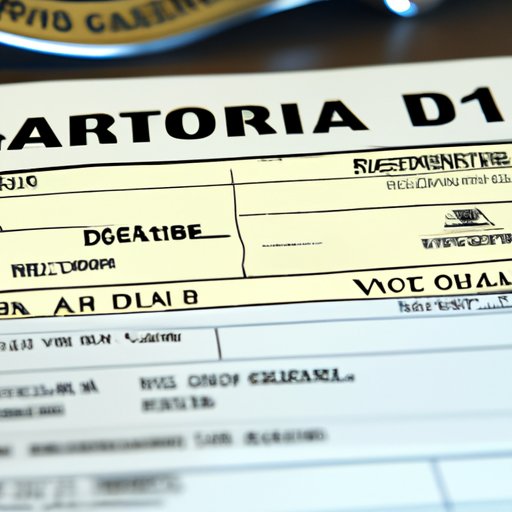Introduction
Registering your car in California is an important step for any driver. It’s essential to understand the laws, regulations, and requirements for registering a car in the state, as well as the benefits that come with doing so. In this article, we’ll explore the steps involved in registering a car in California, provide tips on getting the best deal on car registration, and discuss the requirements and fees associated with the process.
Step-by-Step Guide to Registering Your Car in California
The first step in registering your car in California is gathering the documents needed to complete the process. These include a valid driver’s license, proof of ownership (such as a bill of sale or title), and proof of insurance. You may also need to provide a smog check certificate if your vehicle is more than four years old.
Next, you’ll need to apply for a California Certificate of Title. This document serves as proof of legal ownership of the vehicle and must be completed before the registration process can begin. The title must be signed by both the buyer and seller of the vehicle and should include information such as the make, model, year, and VIN of the car.
Once you have all the necessary documents, you’ll need to submit them to the DMV along with the required forms and fees. Depending on the type of vehicle you are registering, there may be additional paperwork and fees required. Your local DMV office should be able to provide more information about what you need to do.

Navigating the DMV Process: What You Need to Know About Registering a Car in California
When registering a car in California, it’s important to understand the different types of vehicle registration available. The most common type is a standard vehicle registration, which is required for all vehicles driven on public roads. Other types of registration include commercial vehicle registration, off-road vehicle registration, and trailer registration.
In addition to the required documents and fees, you will also need to complete the necessary paperwork to complete the registration process. This includes a Vehicle/Vessel Transfer and Reassignment Form (REG 262) and a Statement of Facts (REG 256). Depending on the type of vehicle you are registering, you may also need to provide additional documentation.
When it comes to payment options, you can pay for car registration in California by cash, check, money order, or credit card. Be sure to check with your local DMV office to find out what payment methods they accept.

How to Get the Best Deal on Car Registration in California
Getting the best deal on car registration in California starts with researching the different fees associated with the process. Be sure to compare prices from various DMV offices to make sure you’re getting the best deal. Additionally, you may be able to take advantage of discounts or special offers that may be available.
It’s also important to understand the insurance requirements for car owners in the state. All vehicles registered in California must carry minimum liability insurance coverage. Failure to maintain the required coverage can result in fines, suspension of your registration, or even criminal charges.

A Comprehensive Look at Car Registration Requirements in California
It’s important to familiarize yourself with the current state laws and regulations regarding car registration in California. This includes understanding the different types of vehicle registration available and the associated fees. Additionally, you should investigate the insurance requirements for car owners in the state and determine if any additional tests or inspections are needed.
Understanding Vehicle Requirements and Fees When Registering a Car in California
There are certain vehicles that require special registration in California. Examples include motorcycles, motorized scooters, and mopeds. Additionally, you’ll need to calculate the applicable taxes and fees when registering your vehicle. Finally, it’s important to understand the renewal process and related fees, as renewing your vehicle registration is a requirement every year.
Conclusion
Registering a car in California is an important step for any driver, and it’s important to understand the laws, regulations, and requirements for doing so. This article has provided an overview of the car registration process in California, including information on necessary documents, fees, insurance requirements, and more. By researching the different fees associated with car registration and taking advantage of discounts and special offers, you can get the best deal on car registration in California.


